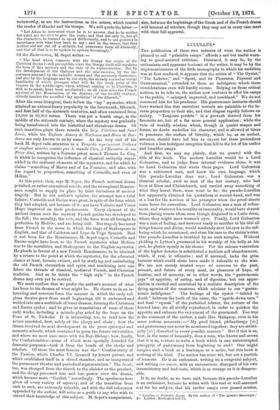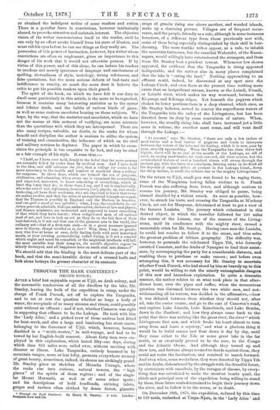LUC ULLUS.*
THE publication of these two volumes of what the author is pleased to call "palatable essays" affords a sad but useful warn- ing to good-natured criticism. Disarmed, it may be, by the enthusiasm and apparent bonhomie of the writer, it may be by the unpretentiousness of the little monographs to which his ambition was at first confined, it appears that the critics of "The Oyster," "The Lobster," and "Sport, and its Pleasures, Physical and Gastronomical," extended to them an indulgence which these considerations even will hardly excuse. Relying on these critical notices, as he tells us, the author now ventures to offer his essays to the public, "enlarged, improved, and combined." We do not commend him for his prudence. His gastronomic instincts should have warned him that succulent morsels are palatable in the in- verse proportion to their size, and that disgust rapidly follows on satiety. " Toujours perdrix " is a proverb derived from his favourite art, but of a far more general application ; while the vein of worldly wisdom which, though in quaint shapes and forms, no doubt underlies his character, and is allowed at times to penetrate the surface of frivolity, which he, as an author, assumes, should have led him to expect for these pretentious volumes a less indulgent reception than fell to the lot of his earlier and humbler essays.
And first, we may say plainly, that we quarrel with the title of the book. The modern Lucullus would be a Lord Guloseton, and to judge from internal evidence alone, it was no Lord Guloseton that wrote these pages. Lord Guloseton was a cultivated man, and knew his own language, which this pseudo-Lucullus does not ; Lord Guloseton was a classical scholar, such as men of the last century, who had been at Eton and Christchurch, and carried away something of what they learnt there, were wont to be ; the pseudo-Lucullus has apparently obtained his quotations at second-hand, and was at a loss for the services of his prompter when the proof-sheets came home for correction. Lord Guloseton was a man of refine- ment, and whatever his morality or immorality, would have shrunk from placing coarse ideas, even though disguised in a Latin dress, where they might meet women's eyes. Finally, Lord Guloseton was a man of feeling, and however ready to sacrifice to his idol all things human and divine, would resolutely shut his eyes to the suf- fering which he occasioned, and close his ears to the victim's cries. Our pseudo-Lucullus is troubled by no such scruples. Without yielding to Lytton's gourmand in his worship of his belly as his god, he glories openly in his shame. For the solemn veneration of the higher devotee is substituted a reckless self-abandonment, which, if real, is offensive ; and if assumed, lacks the grim humour which could alone have made it tolerable to the wise. We are not merely treated usque ad nauseam to the past, present, and future of every meal, its pleasures of hope, of fruition, and of memory, or in other words, the "gastronomic joys" of appetite, of eating, and of digestion, but our appre-
ciation is excited and nourished by a realistic description of the dying agonies of the creatures which minister to our "gastro- nomic indulgence." The feelings of the oyster "tickled to
death" between the teeth of the eater, the "upside-down turn" and final " squeak " of the parboiled lobster, the torture of the
hunted hare, are all vividly reproduced, in order to quicken the appetite and enhance the enjoyment of the gourmand. Too true is the comment of the author, a male Mrs. Malaprop, even in his
more serious moments :—" My good friend, philanthropy [sic] and gastronomy can never be mentioned together ; they are artisti- cally [sic] disunited in every possible manner." But if this is so,
how, in the name of humanity, does a man, who knows and avows that it is so, venture to write a book which is one uninterrupted panegyric of gastronomy from beginning to end ? One might imagine such a book as a burlesque or a satire, but this book is nothing of the kind. The author has some wit, but not a particle of humour. He is an enthusiast, writing on a congenial subject,
and writing con amore, with an unconscious disregard of his own inconsistency and bad-taste, which is as strange as it is disagree- able.
It is, no doubt, as we have said, because this pseudo-Lucullus is an enthusiast, because he writes with this real or well-assumed zeal for his subject, that his earlier essays ever passed muster,
* Lacunas, or Palatable Essays. By the Author of "The Queen's Messenger," ite. London: Remington and Co.
or obtained the indulgent notice of some readers and critics. There is a peculiar force in convictions, however intrinsically absurd, to provoke attention and maintain interest. The objective vision of the writer communicates itself to the reader, until he can only by an effort awake himself from his state of illusion, and must rub his eyes before he can see things as they really are. The possession of this power of fascination, however, bya writer whose convictions are often so unpleasant, gives an importance to this danger of his work that it would not otherwise possess. If by virtue of this power, and of this alone, he can induce his readers to condone not merely ignorance of language and carelessness of spelling, slovenliness of style, tautology, wrong references, and false quotations, but the more serious defects of bad-taste and indifference to cruelty, so much the more does it behove the critic to put his possible readers upon their guard.
The spirit of the book, on which we have felt it our duty to dwell more particularly in this article, is the more to be regretted, because it contains many interesting statistics as to the oyster and lobster trade, and the habits of various kinds of game, as well as some curious anecdotes bearing on these subjects. We hope, by the way, that the statistics and anecdotes, which we have not the means at this mcernent of verifying, are more accurate than the quotations with which they are interspersed. There are also many recipes, valuable, no doubt, to the cooks for whose benefit and discipline the author is anxious to utilise the system of training and examination, the influence of which on the civil and military services he deplores. The paper in which he enun- ciates the principle is too exquisite to be lost, and may be cited as a fair example of his style. It runs thus:—
" I hold, as I have ever held, firmly to the belief that far more persons are annually killed by cooks than by medical men. And I have held to the idea, and still advocate the fact, that a college for cooks is far more necessary to the health and comfort of mankind than a college for surgeons. In these days, which are termed the era of progress, civilisation, and education, when every one is examined for everything, and expected, moreover, to know something of everything, which at least they fancy they do; in these days, I say, and I say it emphatically, when the arts of war, diplomacy, beaurocracy [sic], physic, ay, and stock- brokering, all have their aspirants, who are expected to know that twice six makes twelve, and that the sides of an equilateral triangle are equal, that the Thames is possibly in England and the Hudson in America, and can spell a word of two syllables ; when, I say, the candidates for our future generals, admirals, bishops, ambassadors, doctors of law and physic, and finance ministers, are instructed and supposed to know something of that which they have learnt ; when enlightened men of all nations read of art, and love to look on art as they do on the fair face of their best-beloved, is it not sad that one of the greatest arts in the world, the culinary art—that of a first-rate cook—is in a great measure ignored save in theory, though revelled on in fact ? Why, then, I say, ye gentle- men who live at home at ease, daily finding fault with your matatinal meals, or your evening gormandising called dining, is it not a scandal which ought and must he remedied, or the mightiest intellects will fail, the most amiable lose their tempers, the world's digestive organs be utterly destroyed, and all happiness here on earth sink into disease ?"
We should add that the binding is the most delicate part of the book, and that the semi-heraldic device of a crossed knife and fork alone betrays the grosser character of its contents.



































 Previous page
Previous page